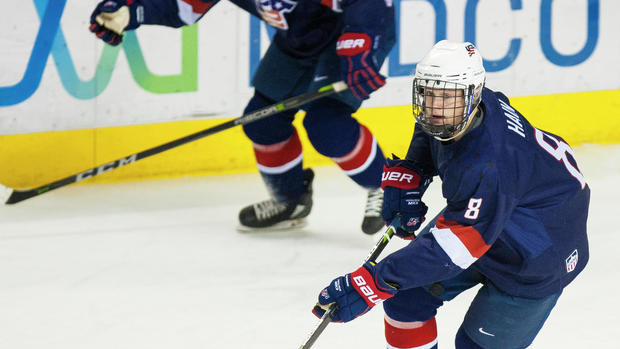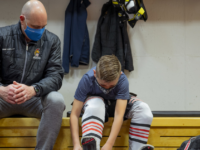It’s every hockey player’s dream: a stranger approaches you and introduces themselves as a scout. They tell you they’ve been keeping an eye on your performance and admit that they like your prowess and potential. They finish by offering you the opportunity to move up to the next level and advance your game. Your big chance has arrived!
Scouting is a crucial component of the hockey world. Hockey scouts act as the all-important funnels that determine which players have the skills to be able to rise to the next level of competition and which don’t quite make the cut.
Every player would love to be scouted, but the chances of being selected by a scout are slim—-you need to be a well-rounded, skilled player. But which skills specifically do you need? What should you focus on so that you have the best chance of grabbing a scout’s attention when they’re looking for players?
Here are 5 important skills that hockey scouts look for:
1. Hockey sense
As the level of skill in hockey increases, the available time to make a play shortens. In the lower age groups, once you get the puck, you might have a few seconds to assess the situation and decide on the best play. In the NHL, however, decisions must be made in a matter of milliseconds, because every player at that level has incredible reaction time. So, being scouted means playing at a level where decisions have to me made faster.
Because of this, one of the central skills that a hockey scout looks for is hockey sense. Hockey sense is a player’s ability to assess everything that’s happening on the ice and anticipate what will happen in the future. A player with good hockey sense is aware of the state of the game and can quickly decide on the best play.
Hockey sense is mainly developed naturally, by practicing and playing games. However, it can also be worked on by studying the game. Watching NHL games as well as your own game film can speed up the development of your hockey sense. When you’re watching games, pay attention to the positions of all the players and try to identify potential opportunities for good plays.
2. Hard and selfless passes
One consequence of playing at a level where players have faster reaction time is that weak, slow passes will get intercepted.
If you want to move up the ranks in the hockey world, you need to be able to pass the puck hard and fast. As a passer, you want to ensure the puck travels to its destination without getting into the hands of the opposing team. The best way to do that is to pass it to its target with force (without sacrificing accuracy, of course).
On a similar note, to be scouted, you need to be able to pass the puck selflessly. Sure, you might have a great opportunity to score, but if one of your teammates has a better opportunity to score, then pass the puck to them! You need to be willing to give up the potential excitement and glory that comes from scoring your own goal in the name of teamwork.
3. Shooting ability
If you want to be a star hockey player, you need to know how to shoot well (unless you’re a goalie). So, it may sound obvious, but hockey scouts always look at each player’s shooting ability to determine if they’re ready for the next level.
There are two main factors that make up a good shot: speed and accuracy.
First, like with good passing mentioned previously, shooting faster is always better. The faster the shot, the less chance it has of getting blocked or intercepted by another player or saved by the goalie. And by a “fast shot,” I’m not only talking about the speed of the puck after its release, but the speed of the release, itself. Once the puck touches the blade of your stick, the faster it leaves the blade, the more likely you are to score, because your opponents will have less time to react to the shot and a quick release causes more rebounds.
Having a quick shot is no good, however, if the puck always misses the net by a mile. Along with speed needs to come accuracy—-and accuracy is arguably the most important factor of the two.
4. Finishing checks
Like it or not, body checking is essential in the sport of hockey. It also becomes more common as the skill level of hockey players increases.
One of the most decisive factors for scouts evaluating prospects is how often the player takes opportunities to body check, and whether that player finishes their checks. By “finish a check,” I mean follow through with the body check, even if the puck is elsewhere on the ice. A successful check will remove an opponent from play for a few seconds, which can make all the difference in either successfully defending your net or scoring a goal.
In theory, a good body check is delivered to the midpoint of the opponent’s body, since that’s where the center of gravity is located. Delivering a hit to the center of an opponent’s body gives the best chance to knock them off their feet and take them out of play for as long as possible.
5. Defensive play
The final important skill that scouts look for is aptitude for defensive play.
Many players focus too much on attacking, because that’s how goals are scored against your opponents. Scoring goals is no good, however, if the opposing team is scoring more goals against you.
Scouts look for players, no matter the position, who have fantastic awareness for when they need to play defensively. For example, they look at how players work when they don’t have the puck. They want to see if they lazily coast around to the action or if they can anticipate the future action and work hard to get themselves into an advantageous position.
Scouts also look at how players use the space around them to fend off opponents. The couple feet of body space that all players have is crucial for setting up a “defensive zone.” Players who are more willing to use their body space to stop intruders are more likely to catch the attention of a scout.
Now that you have the knowledge about some of the main skills you need to get scouted, the only thing left to do is practice! Work on your hockey sense, passing, shooting, body checking, and defensive play to maximize your chances of getting that coveted invitation to the big leagues.
Unfortunately, this isn’t a foolproof method of being scouted, however. You still need other variables like a good work ethic, a good attitude, and determination. But if you master the 5 skills mentioned above along with having a strong mindset, you’ll be an unstoppable force in the sport of hockey.






